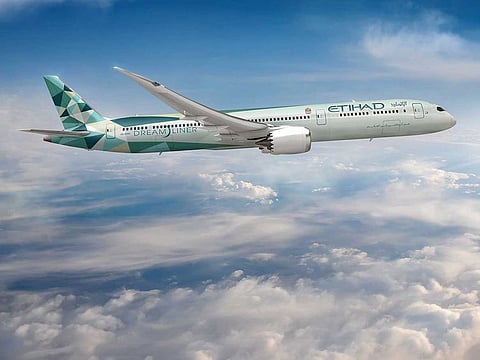28 UAE-Israel flights per week, Etihad to fly first
Boeing 787 aircraft will carry a special delegation to Tel Aviv and return on October 21

Abu Dhabi: Etihad Airways will become the first Gulf-based carrier to operate a commercial passenger flight to and from Israel, by bringing Israel’s top travel and tourism leaders to the UAE. The historic flight, flown in partnership with the Maman Group, will depart Tel Aviv on October 19.
The Boeing 787 Dreamliner aircraft will fly on a three-and-a-half-hour journey from Israel to the UAE. The return journey will depart Abu Dhabi on October 21. A total of 28 weekly flights are expected between UAE and Israel, it was reported Sunday.
The first Etihad flight will bring a group of tourism industry leaders, key corporate decision makers, travel agents, and cargo agents, along with media personnel to experience Abu Dhabi and the wider UAE. "Today’s flight is a historic opportunity for the development of strong partnerships here in the UAE, and in Israel, and Etihad as the national airline, is delighted to be leading the way,” said Mohamed Mubarak Fadhel Al Mazrouei, Chairman, Etihad Aviation Group, in a statement.
“We are just starting to explore the long-term potential of these newly-forged relationships, which will be sure to greatly benefit the economies of both nations, particularly in the areas of trade and tourism, and ultimately the people who call this diverse and wonderful region home.”
Fast-tracked
This is the latest development in a growing cooperation between the two nations following the establishment of diplomatic ties, and the signing of the Abraham Accords in Washington on September 15. Israel's national airline El Al’s made a first symbolic flight between Tel Aviv and Abu Dhabi on August 31.
The flights between Tel Aviv and Abu Dhabi will also carry commercial cargo sourced from, and destined for, points across Etihad’s global network, in addition to commercial guests. Etihad also becomes the first non-Israeli airline in the Middle East to launch a dedicated website for the Israeli market in Hebrew.
How high will rates be?
Ticket rates are subject to supply and demand, says aviation analyst Brendan Sobie. “Given there will be several airlines flying between Israel and the UAE, there should be significant supply.”
Before there are full-fledged flights between the countries, a mutually acceptable visa regime change is a must. “Although we have been getting travel enquiries from Israelis since the signing of the peace deal in August, we are unable to apply for visas for Israelis,” said a spokesperson for Regal Tours Worldwide.
Even then there’s a lot more that needs to be done. “Airlines will have to secure all the required regulatory approvals as is always the case with a new international route," said Sobie. "They will need to pick suppliers and forge partnerships to support the flights operationally and facilitate distribution in the destination market.
“It's not only about meeting demand in the local UAE-Israel market, but also about offering connections from Asia-Pacific to Israel via the UAE. This is a growing - at least before COVID-19 - market that does not have many non-stop options and often [rely on] circuitous one-stop connections.
“For example, Singapore-Israel is a fairly large market UAE carriers can serve with shorter transit times compared to existing connections such as backtracking via Istanbul.”
Israel's national airline El Al flew an Israeli-US delegation from Tel Aviv to Abu Dhabi on August 31 for the first official visit to the Emirates. On September 15, the UAE and Israel began the process of normalising ties by signing the Abraham Accords.
On October 18, the Israeli Transport Ministry stated that among several new agreements signed with the UAE was a framework for 28 direct flights a week between the countries.
Sign up for the Daily Briefing
Get the latest news and updates straight to your inbox






